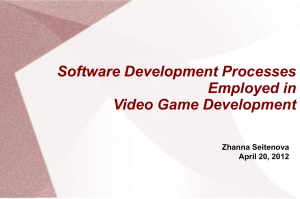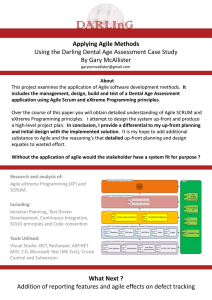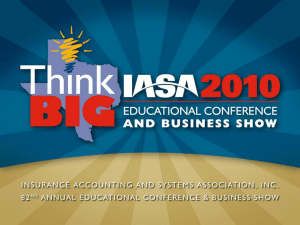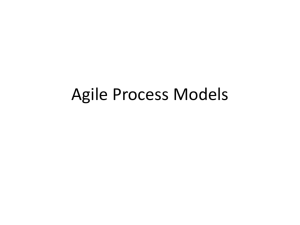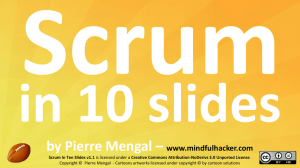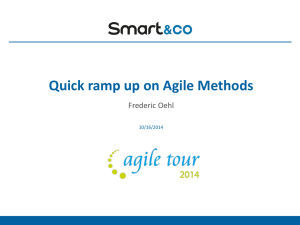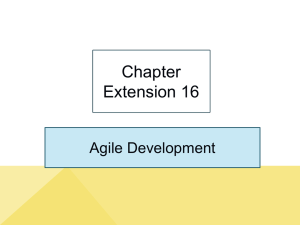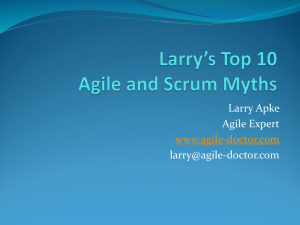Traditional PM - Dallas Fort/Worth
advertisement
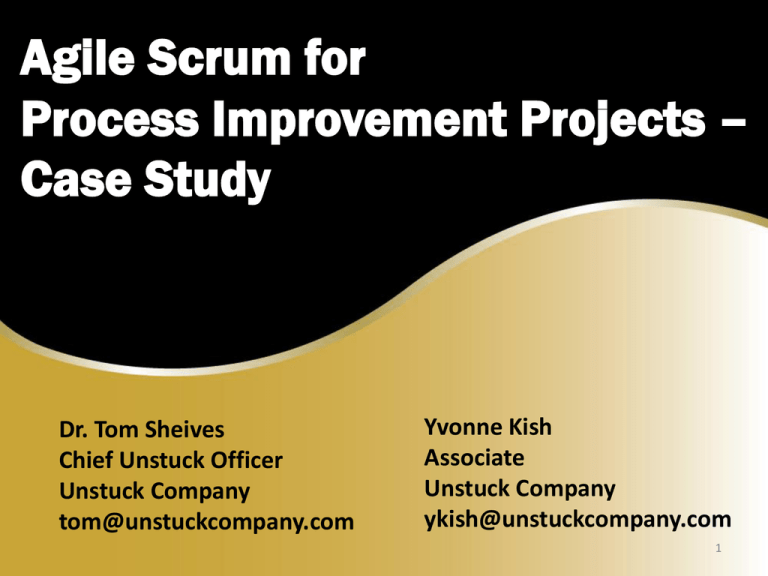
Agile Scrum for Process Improvement Projects – Case Study Dr. Tom Sheives Chief Unstuck Officer Unstuck Company tom@unstuckcompany.com Yvonne Kish Associate Unstuck Company ykish@unstuckcompany.com 1 Pecha Kucha • • • • • Japanese 20 Slides, 20 seconds per slide - timed 6 minute, 40 second presentation No questions Agile like – lean and short lived sprints 2 Objective of today’s presentation • Overview of similarities and differences between traditional project management and Agile Scrum – General – Process Improvement Projects • Case study of process improvement project using Scrum 3 Fundamental Questions Question Project Focused Methodology Results Focused Requirements are vital! Business Value Traditional Project Management Agile - Scrum Yes Yes Yes Yes Yes Yes Yes Yes Yes Yes 4 Fundamental Difference Question High Business Value to Client – Early! Change to product scope is Encouraged during project Traditional Project Management Agile - Scrum No Yes No Yes 5 Wheel of Fortune Traditional Project Management - PMI Monitoring and Controlling Planning Initiating Closing Executing 6 Scope Traditional PM • Progressive Elaboration Agile - Scrum • Product Backlog and Release Planning 0.0 1.0 2.0 2.1 3.0 Product Backlog 2.2 2.2.1 2.2.1.1 4.0 2.2.1.2 2.2.2 2.2.2.1 2.2.2.2 7 Time Traditional PM • Phases, Gantt Charts Agile - Scrum • Sprint 0 – Planning • X Week Long Sprints Sprint 0 Sprint 1 Sprint 2 Sprint 3 2-4 week Long Sprints 8 Cost Traditional PM • Estimated total – top down, bottom up Agile - Scrum • More focused on business value and ROI of product features – cultural* Highest business value features are “first” in agile – business side must be more flexible with agile 9 Quality Traditional PM • Quality planning, assurance, control Agile - Scrum • Zero defects, test driven development 10 Risk Traditional PM • Risk planning, risk identification, mitigation – weekly or biweekly monitoring – more strategic Agile - Scrum • Daily standup identify barriers and risks – reduction of impediments tactical 11 Communication Traditional PM • Important – not daily to team – status meetings Agile - Scrum • Daily collaboration – users and customers • Communication • Collocate is highly preferred 12 Procurement Traditional PM • Long Lead Items planned for In procurement planning Agile - Scrum • Handled outside scrum 13 Human Resources Traditional PM • Sponsor, project team members, project manager •Some cultures – Agile might be stumbling for them – executives and middle management have to buy in to the “flexibility” and the “less overall total apparent visibility” Agile - Scrum • Pigs and Chickens, scrum master Pigs Chickens 14 Integration Traditional PM • Change can happen anytime • Requires impact analysis (time, cost, risk, quality) • Not as nimble Agile - Scrum • Changes in scope during a sprint not allowed • Backlog changes between sprints • Impacts determined between sprints 15 Initiating Traditional PM • Project charter • • • • Agile - Scrum No project charter Product vision statement “Stakeholders” are vital – collaboration is daily Upfront agreements on Scrum process are obtained 16 Planning Traditional PM • WBS, Gantt charts, communication plans, and other plans Agile - Scrum • Release planning • Sprint planning 17 Executing Traditional PM • Many moving parts – not as focused and targeted Agile - Scrum • Fewer “moving parts” during execution – simplified approach 18 Monitoring and Controlling Traditional PM • More on a weekly or biweekly basis Agile - Scrum • Daily Scrum Meetings – constant “monitoring and controlling” Rugby Scrum 19 Closing Traditional PM • Lessons learned – end of phases, end of project Agile - Scrum • Retrospective end of 2-4 week long sprints (product and process, burndown, more attention, velocity) How can we increase velocity*next time? *Number of features or functions points per unit time 20 Process Improvement Projects • • • • Traditional PM Project Charters Plan to implement multiple improvements Shorter projects Low hanging fruit Agile - Scrum • Stay Tuned for next segment of presentation! 21 Dr. Tom Sheives Bio Tom is a speaker, educator, consultant, author, and coach. His mission is to “Get Project Teams and Management Teams Unstuck!” Tom’s new book “OPPORTUNITY unstuck!” describes key principles discovered from his recent experience in training over 175 executives in Project Management with the Panama Canal Authority. Tom is also is on the faculty of the University of Texas at Dallas and Embry Riddle Aeronautical University. Contact Information: Tom Sheives "Get Projects, Processes and People unstuck!" Chief Unstuck Officer – Unstuck Company www.unstuckcompany.com tom@unstuckcompany.com 817-465-1318 22 Yvonne Kish Bio Yvonne is as independent software consultant and trainer mainly working with The Westfall Team and she is also an associate of The Unstuck Company. Her main focus area is Software Quality Assurance and Test Management, Process Definition and Improvement, Audits and Assessments, Tools Engineering and Test Automation, Software Configuration Management, Training and Consulting. Contact Information: Yvonne Kish "Get Projects, Processes and People unstuck!" Associate – Unstuck Company www.unstuckcompany.com ykish@unstuckcompany.com 469-441-6149 23
